Re: Phase separation, ie. Watery fuel
by Joseph Porrazzo » 3 years ago
Sean, are you serious? You think I meant "clear" as in the color? 33 years of flying including 22 in fighters and I can say your comment made me laugh harder than anything I've heard. But good on you for not using E10.
Listen, I want the rotax community to know about my experience and be aware of the risks associated with E10. I spoke with 3 A&P's after the incident all with extensive rotax knowledge and they all had the same opinion. In fact, it was one of the A&P's who sent me the video.
The entire fuel system was inspected and no discrepancies were found. We put fresh 100LL in it and it ran like a clock. Needless to say I'll accept the more frequent oil changes to avoid a similar event in the future.
Re: Phase separation, ie. Watery fuel
by Roger Lee » 3 years ago
A&P's can be wrong on a regular basis especially when it comes to science and or they fail to FULLY investigate and run test vs just blaming something they think caused an issue. They don't have a chemistry back round and rarely fully run science based test to prove or disprove issues. Pointing a finger is easy when you listen to a misinformed person. This is why I do so much research and testing. We've all been told things in out lives that we later found out were false or misleading.
Thousands of aircraft owners world wide use ethanol fuels at different levels and in many different types of engines. Rotax approves 10%. E10 in the US it is low compared to others in the world.
p.s.
My biggest problem is when I see a Rotax engine light sport aircraft for the first time and what A&P's do to it without learning about Rotax, researching SB's and not knowing what the Light Sport regulations are, but they'll tell you they know it all since they've worked on Continental's and Lycoming's for 30 years.
My advise to any owner is do your own research, testing and above all read from credible sources.
Hearsay is wrong more times than right.
Roger Lee
LSRM-A & Rotax Instructor & Rotax IRC
Tucson, AZ Ryan Airfield (KRYN)
520-349-7056 Cell
Re: Phase separation, ie. Watery fuel
by Jeffry Stetson » 3 years ago
The chance of getting bad Rotax advice from USA standard A&Ps approaches 100%. Their guesses can easily cost an engine. Use this link to identify those with iRMT (Rotax) training and certification.
https://dealerlocator.flyrotax.com//
Still, no guarantees. Remember that the OWNER has ultimate responsibility for their own aircraft, so not the A&P. Hence, best is to also take the courses yourself - Service & Line Maintenance will serve owners well and save money in the long run; it did for me.
https://rotaxirmt.com/rfsc-courses
As a precaution against getting a "pure water" sample, use one of these. It has a fine screen on top that will not pass water, so no confusion is possible.

Re: Phase separation, ie. Watery fuel
by Steve Hirschi » 3 years ago
Not so fast on the water/ethanol in the fuel being a benign event. Biological contamination of the fuel is a very real possibility and subsequent clogging of fuel filters leading to fuel restriction, engine sputtering and spoiling an otherwise picture perfect day trip. The terrain in the Canyonlands area (southeastern Utah) looks very knobby when your Rotax 914 is loosing rpm and MP. The biologicals just love to grow on the interface of the water/ethanol and fuel, forming a mat (a real biological term). The sides of the tank are also a favorite growing site. A slime forms on the exposed sides of the tank, then flakes off. Both classes of gunk are sucked into the fuel filter. The filter tries its best but eventually clogs. Any water contamination in the fuel over time will eventually lead to biological contamination, especially in ethanol fuels (ethanol loves to collect water). 100LL will also acquire water from condensation if you have high humidity or warm days and cool nights common above the official mountain terrain, in excess of 3,000 MSL. I recommend reading Chris Lowery's "Microbial Handbook" available for $39.95, comes with cool pictures. Section one applies to Airplanes. Section 2 is for FBO's. I found it and several other helpful articles on the internet dealing with biological fuel contamination. Most deal with jet fuel but 100LL is not immune. The biologicals can also acidify the water and ethanol causing degradation of exposed metal parts like fuel strainers, metal fuel tanks, and float bowls. I have a couple of badly pitted bowls I keep to chase away complacence.
I drain a pint of fuel once a week during periods of bad flying weather and prior to flight. I use 2 high capacity see through filters stopping the particle size specified by Rotax, I examine them on each preflight, and I change them frequently. So far no more sputtering engines. Hope this helps.
Steve Hirschi, stevehirschi49@gmail.com
Re: Phase separation, ie. Watery fuel
by Sean Griffin » 3 years ago
Most farmers know all about microbial contamination of diesel - there are fuel additives that will inhibit microbials growth, if used periodically
If used to clean up an existing problem, will cause filter blockage, as the bugs die off and become free floating in the fuel.
|
To receive critical-to-safety information on your ROTAX Engine, please subscribe to |
This website uses cookies to manage authentication, navigation, and other functions. By using our website, you agree that we can place these types of cookies on your device.
You have declined cookies. This decision can be reversed.
You have allowed cookies to be placed on your computer. This decision can be reversed.
This website uses cookies to manage authentication, navigation, and other functions. By using our website, you agree that we can place these types of cookies on your device.
